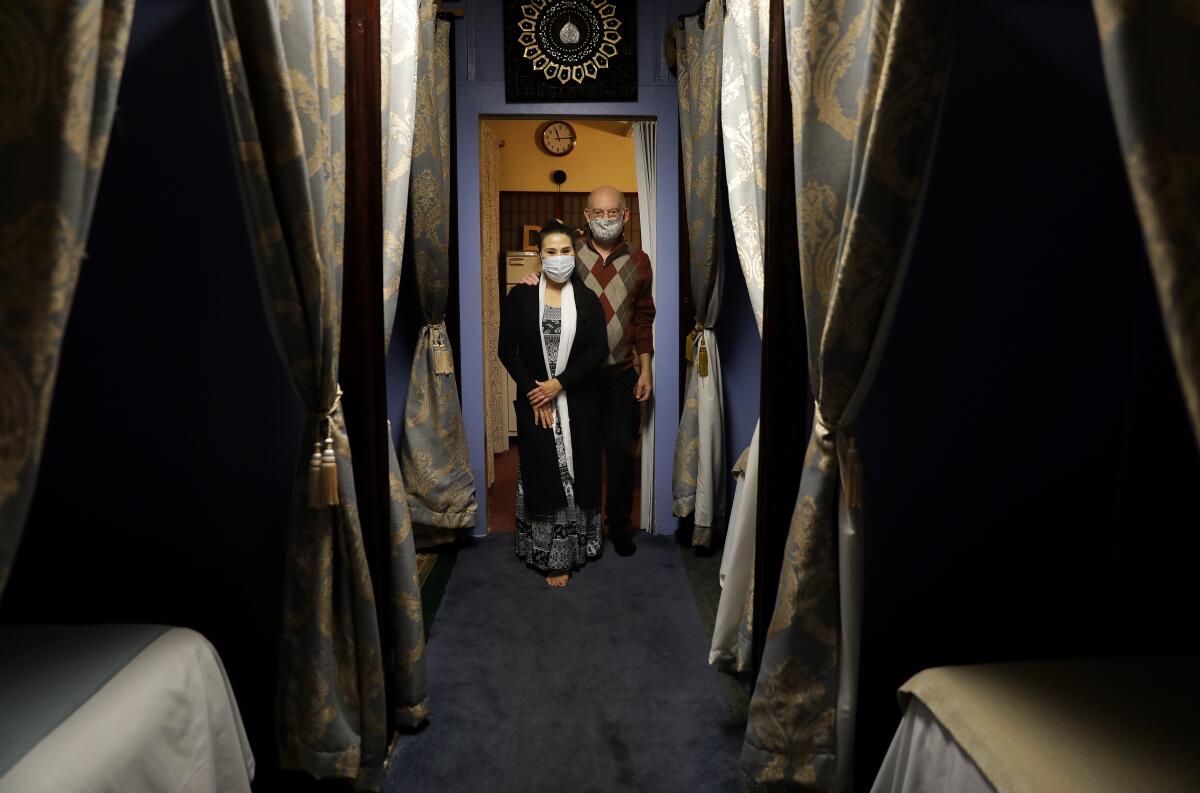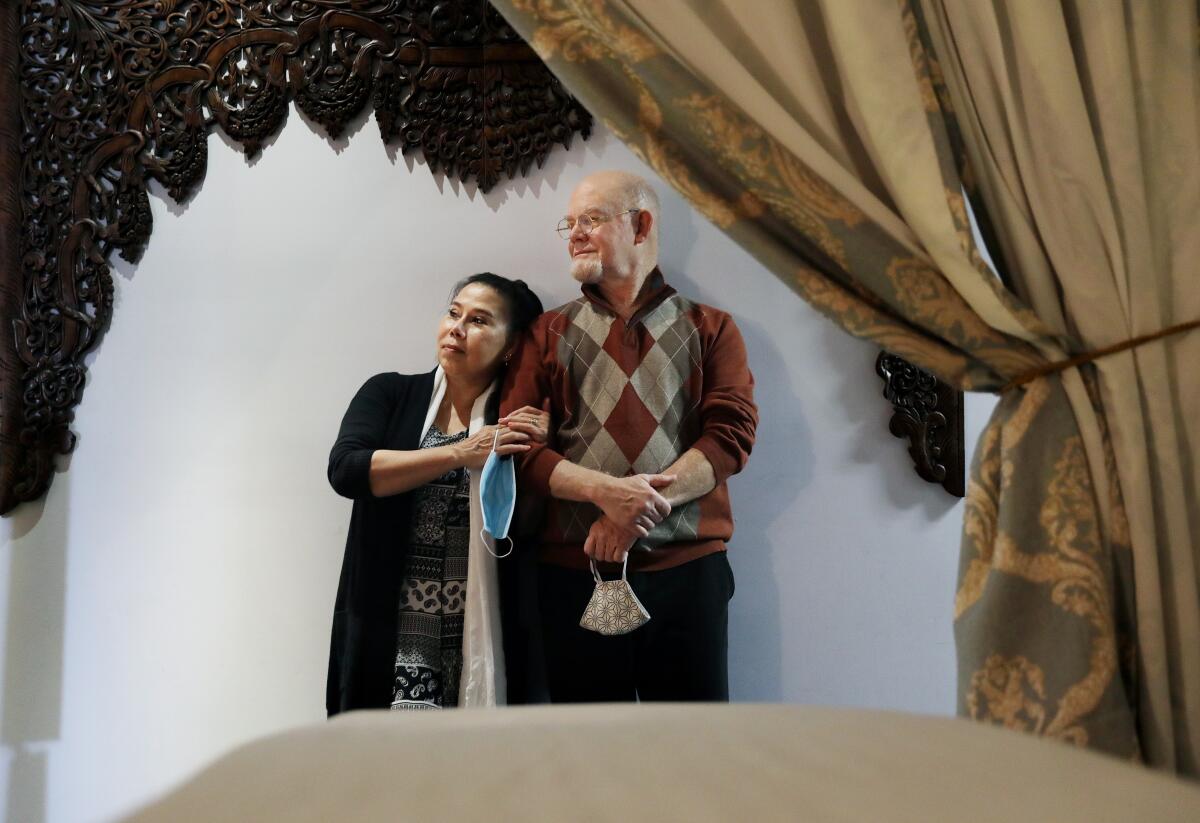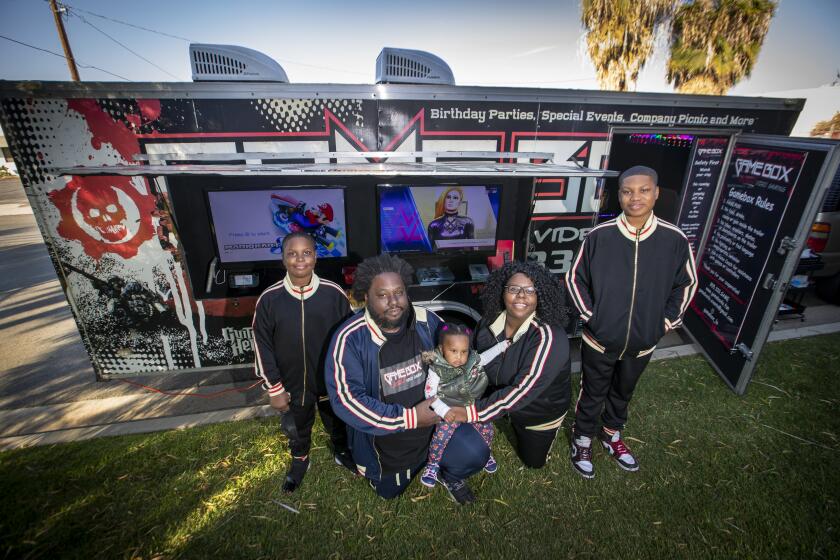When will spas reopen? Not soon enough, for those who use L.A.’s spas as a sanctuary

- Share via
Spa owner David St. James began reaching for the ringing appointment line on an early December morning. Then a difficult realization set in: It didn’t matter if he picked up the phone.
“It’s useless. I don’t need to answer it. We’ve already changed the outgoing message,” said St. James, who runs Royal Thai Massage and Beauty with his wife, Chanispha, a licensed massage therapist who was born in Thailand.
The new message delivers the bad news that the spa isn’t operating because of the latest coronavirus protection order and ends with a hopeful, “We will reopen on Jan. 2 of next year.” But no one knows that for sure, and it’s looking increasingly likely that the shutdown will be extended, at least in Southern California.
The ringing phone was another reminder that nothing the couple has done to make their business safe for customers has helped them avoid another pandemic shutdown. They’ve drenched the welcome mat with Lysol and bought ultraviolet germ-killing machinery, plus a sterilizer for already washed sheets and massage clothes.
Spas come in myriad varieties — from ritzy celebrity magnets to modest mini-mall stops like Royal Thai — offering various specialized forms of massage therapy, health and grooming treatments and relaxation.
There are franchised operations and neighborhood ethnic spas — among them Thai, Russian and Korean. Some are cavernous places with multiple pools and saunas as well as spots to lounge, nap, eat and, at Korean spas, get every inch scrubbed clean.
All in L.A. County are closed (with exceptions for medical-related treatment) during the current stay-home lockdown. Some spa owners are worried about whether they will ever be able to reopen.
The lucky among California’s small businesses have cobbled together loans and grants to get through the pandemic so far. But that money has dried up, and “you can only take on so much debt.”
Customers say they pine for a key source of stress relief, well-being and community. Spas have been a crucial escape from the confines of their homes, where they can recharge to face another day of the pandemic.
Meghan Hill spends her days monitoring data analytics to judge the effectiveness of television commercials. The 26-year-old has depended on Royal Thai Massage and Beauty’s services, soft music, subdued lighting and Thai artwork to help her forget the outside world.
Working from home so much “just adds a lot of stress, not only emotional stress, but physical stress on my body,” Hill said. “Sitting all the time ... my body just hurts.”
The spa visit leaves her “refreshed, rejuvenated from an hour and a half of pampering. I wish I could go every day,” she said.
Few seem to feel the loss as acutely as customers who frequented the city’s Korean spas, who have poured their frustration onto social media. Many of those facilities had 24-7 operating hours and offered an inexpensive level of service so expansive that they were regarded more like sanctuaries by clients who often stayed several hours at a time and sometimes even slept there.
At Koreatown’s Wi Spa, for example, which didn’t reopen in November as some other spas did, a $30 fee got you in the door without a time limit. Visitors could add services to be delivered in separate areas for women, men or everyone. There were cold baths and hot saunas, rooms lined with clay or salt, a restaurant, a rooftop lounge, a library and napping rooms.
Downtown Los Angeles resident Amirah Safieddine said she deeply misses the peace of mind Wi Spa delivered, even more so now because the pandemic has removed so many other options to recharge.
Safieddine, a real estate agent, said she could “spend the whole day there. My routine is usually go to the different Jacuzzis, then the steam room and sauna that they have in the women’s section for a couple of hours, then go upstairs, have lunch, following lunch take a nap, go to the different saunas upstairs, and end again downstairs removing all the dead skin. Shower and go home.”
How four small businesses have survived in the COVID age.
Los Angeles comedian and podcaster Lucé Tomlin-Brenner described Wi Spa as “one of those few precious places” where “you’re just not reachable. It seems in the pandemic the only excuse you have for not being available is actually being sick — or the crushing depression of it all, though few want that excuse. It’s much more glamorous to say, ‘Sorry I missed you. I was at the spa.’”
“I probably mutter, ‘I miss Wi Spa,’ at least once a week,” Tomlin-Brenner quipped. “I want it to survive so badly.”
Like many people operating personal service businesses, spa owners’ frustration comes with a dollop of helplessness.
No matter how strictly they followed new guidelines, they were powerless to change the infection explosion beyond their doors. County orders, which vary around the state, have been particularly strict with spas, massage therapists and some other personal care specialists such as aestheticians and tattoo artists.
David and Chanispha St. James increased expenses with new disinfecting equipment and a more costly laundry service. They cut income possibilities by dropping from seven beds to five for safer spacing. They added 15 minutes between massage sessions for cleaning and disinfecting but kept massages at the usual one-hour duration.
“As soon as we reopened in November, many of our clients came back,” David St. James said. “We were busy the whole month. We were able to pay the full rent for December, plus a little extra toward the back rent that we owed. Now this, which is the third shutdown we’ve had this year.”
When her nine Massage Envy franchises in Southern California were forced to close in March, Shamicka Lawrence did more than just follow the new health guidelines established for reopening in June. She took 10 days to retrain her staff to make sure that they were not only prepared, but confident about their own safety. She also decided to open only four of the locations to see how it would go.
From a seamstress who’s making masks to a restaurateur-turned-personal chef, these Californians are rethinking how they can earn money in the coronavirus economy.
“It was working,” Lawrence said. “But the reality is, we were at 50% capacity of what we were doing before.” Then another surge of infections spread across California, and just 14 days after her limited reopening, an order for another shutdown occurred.
“We went above and beyond the health protocols, and it didn’t matter,” Lawrence said. “We still had to close.”
Massage Therapy Center owner Karin L. Nassar said she reached out to clients of her Sawtelle neighborhood spa to reassure them about all of the safety precautions she had put in place, but she has felt their reluctance about health risks.
“I’m advertising more than ever, but people are scared,” said Nassar, who before the latest shutdown was seeing 20% of her usual business. Nassar estimated she spent about $7,000 on new sanitizing equipment and owes about $60,000 in rent on her $15,000 monthly lease.
“If I keep going as I am, there’s no way that I can avoid bankruptcy,” she said.
Nassar is an acupuncturist who had nearly a decade of experience running her own practice before buying the massage business. She said she is lucky to have made an arrangement with a chiropractor before the shutdown, allowing her business to continue to see medical referrals.
Now, she’s just hoping she can begin soon to build her clientele back up to pre-pandemic levels.

Back at Royal Thai Massage and Beauty, David and Chanispha St. James are hopeful.
He’s an actor who has played small parts in television and film for decades and is well acquainted with how long it can take luck to change. In 2020, at the age of 73, he played in three episodes in the HBO “Perry Mason” crime drama, in the role of Dr. Bundy.
“I’m optimistic,” he said. “When we reopen again, whenever that is ... everything will start again. Our clients will come back. I’ll pay the landlord as much as I can, and we will eventually catch up.”
More to Read
Inside the business of entertainment
The Wide Shot brings you news, analysis and insights on everything from streaming wars to production — and what it all means for the future.
You may occasionally receive promotional content from the Los Angeles Times.













